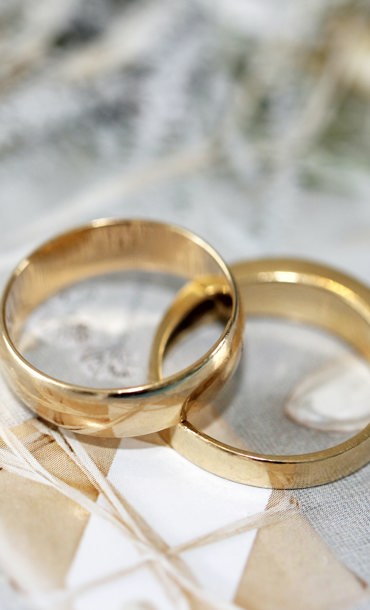Marriage and civil partnerships

Ensuring your marriage or civil partnership is legally binding
Legally binding marriage or civil partnership ceremonies can only be performed by:
- or in the presence of, registrars who are registered with the General Register Office, at a licensed venue or ceremony room; or
- an 'authorised person' at a religious building.
You will only be legally married or civil partnered if you have gone through the process of giving notice and having a legal ceremony. This can only be done through our registration service or a registered religious building.
Your marriage or civil partnership is legally recognised from the time of your ceremony with our registrars.
We call ceremonies that are not legally binding 'celebratory ceremonies'. If you want to celebrate in an unlicensed location while ensuring you are legally married or civil partnered, see our Bespoke ceremonies page.
What we do
Your registrar ensures the legalities are correct as well as performing a delightful, personal ceremony.
There are many options you can choose to customise your ceremony and make it unique. These include additional custom vows, non religious readings and music. See our Your ceremony day page.
Plan your ceremony
Step 1: Check that you can get married or form a civil partnership
Check that you are legally able to form a marriage or civil partnership.
Step 2: Decide where and when to hold your ceremony
You'll need to choose the venue and decide on your preferred date and time for your ceremony to take place.
Make sure you have read the information at the top of this page so you can be assured that your ceremony is appropriate for your needs.
Use these links to discover your options.
Step 3: Check registrar availability and book your ceremony
See what you need to do before you can check registrar availability and complete our form which gathers all the information we need to book accordingly.
Step 4: Declare your intention to marry or form a civil partnership (Give notice)
You must attend a face-to-face appointment and sign legal paperwork to declare your intention to marry or form a civil partnership. This is called 'giving notice' and includes providing details about the date and venue of the ceremony. Therefore, your ceremony must be booked before you can give notice.
Use this link for more information about giving notice, including the documents you'll need and the form to book your appointment.
Step 5: Ceremony choices
Information about what happens in ceremonies at a licensed venue or our ceremony rooms, whether they are simple ceremonies with just legal declarations or you want to add personal touches such as music, additional vows or readings.
If you have booked your ceremony, you can complete the relevant ceremony choices form.
Step 6: After your ceremony
Find details about certificates that are issued as part of your ceremony and you order additional copies if required.
If you had children together before your ceremony, legally the child's birth must be re-registered. You can find information about how this is done.
Other marriage or civil partnership related enquiries you may have
-
See information on GOV.UK.
-
See our Converting a civil partnership to a marriage page.
-
Either, or both of you, may choose to change your name after your ceremony but this is not a legal requirement.
You can find guidance on changing your name on your passport before your ceremony.
- To apply for a passport in your new name you must complete a ‘passports for newly weds and civil partners’ form (PD2).
- The form must be signed by the Registrar/Minister of Religion who will be performing the ceremony but can only be completed once you have given your notice of intent to marry or form a civil partnership.
- To have your PD2 form signed by West Sussex Registration please email us the form completing Part two and include the name of the passport office to which you will be applying for your passport. Email the form to ceremonies@westsussex.gov.uk.
-
The Registration Service are not involved in this process, although if your marriage or civil partnership occurred in West Sussex and you need a copy, you can order certificates.
Find more information:
We do not have copies of paperwork relating to divorce or the end of a civil partnership. Find information about how to get a copy of your decree absolute or final order on GOV.UK.
-
If English is not your first language and you are unable to understand legal questioning in English, you may need to bring a translator to your giving notice appointment and ceremony.
If you have any queries about this, complete our general enquiries form.
